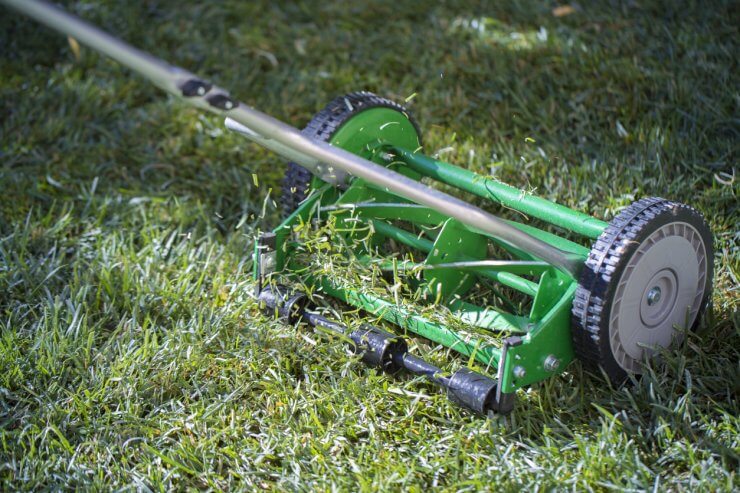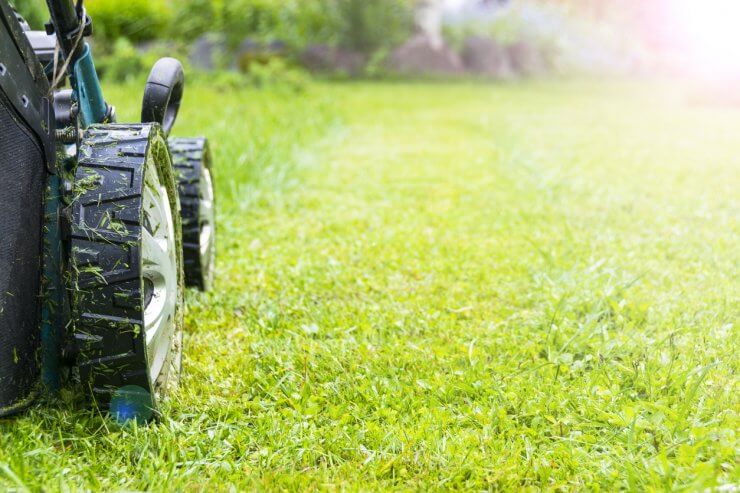
I have some bad news. All that time you spent raking grass as a kid? You didn’t need to do that. You could have been off riding your bike or playing video games while the grass was turning into grass compost. Sort of, anyway.
Grass is loaded with nitrogen, potassium, and phosphorous. As grass decomposes, it also feeds beneficial bacteria in the soil. As long it’s not clumped up or too wet or too long, you can leave all those grass clippings, and they will help fertilize your lawn.
However, all that nitrogen, potassium, and phosphorous also make grass an excellent compost. Again, sort of.

Discover 7 top tips for growing, harvesting, and enjoying tomatoes from your home garden—when you access the FREE guide The Best Way to Grow Tomatoes, right now!
Grass compost: What you need to know so your compost doesn’t stink
You might think with grass compost that you could dump all your grass clippings into a compost heap and come back in a few weeks to find lovely, nutritious, finished compost. That’s a big mistake that more than a few people make. Unfortunately, it’s not quite that easy. Don’t worry, though; it’s also not hard.
Just a quick refresh on compost: For compost to break down and create that wonderful product that helps your vegetable garden thrive, you need that famous green and brown mix. Greens, such as grass clippings and food scraps, provide nitrogen, while browns, like newspaper or dead leaves, provide carbon. Together, the nitrogen and carbon feed the microbes that break down these materials into finished compost.
So grass compost, with only grass, won’t actually give you compost. In fact, it will start to decay and give you a smelly mess. But grass mixed into your regular compost pile will help move things along and result in a super-rich compost that you can use in your garden.
So in just four simple steps, you can turn your lawn mowing efforts into delicious tomatoes.
- Mow your lawn.
- Collect the grass clippings (which happens to be pretty easy if your mower has a bag).
- Add your grass clippings to your compost pile and use a garden fork or shovel to blend it in, so the grass gets distributed.
- Wait.
That’s it. Grass compost is that easy. But I’ll make it even easier for you. Chances are good that you have plenty to compost already: eggshells, egg cartons, newspapers, banana peels, dry leaves, onion skins, and so on. The grass can be an excellent addition. Or you can just leave it on your lawn after you mow, where it will become fertilizer and help your yard stay nice and green.
Oh, and a few final tips if you decide to compost your grass:
- If your lawn is chemically treated, skip the composting and just get rid of your grass clippings.
- If your lawn is diseased, it’s best to get rid of the grass clippings.
- If you compost a lot of grass, be sure to add plenty of brown materials so it doesn’t smell bad.
Now go mow your lawn.
Do you collect your grass clippings and add them to your compost? I’d love to get your thoughts on composting grass.
Discover 7 top tips for growing, harvesting, and enjoying tomatoes from your home garden—when you access the FREE guide The Best Way to Grow Tomatoes, right now!





I use my grass clippings to mulch my plants. The clippings keep the dirt cooler, hold moisture, and break down to nourish my crops. I have been doing this for years and my plants thrive.
I throw my grass and leaves in an old dog pen and throw a shovel of dirt over it. (I get this from next year’s garden spot). Each bag of grass gets a couple of shovels full. Then next year I just shovel it all back into the garden. I get nice, fluffy soil to work with. I had hard pan when I started and great soil when done. (Figured this process out when in TN)
The green grass goes to the chooks. I compost the leaves in fall in black bags. y1 Takes a year to naturally decompose so the first year is a a bit of loss at least plantwise but in the fall you have that compost to rake into your beds. Now cover black plastic and mulch for winter y2. Come the spring y3 you’re gold.
Great article, unless you have bermuda grass. Putting that in a compost pile will just grow more bermuda.
Yes I add it to the fall leaves and let the pile sit all winter. Come spring I stir the pile to get it really mixed up. Makes wonderful compost. I also spread grass clippings in my flower beds. Helps hold down the weeds. Grass clippings never go to waste here. Dana
Definitely going to try this composting!
I’ve used grass for years to break up and amend my natural clay soil without any composting delay.
To avoid the smelly, anaerobic stage, just be sure to not leave 6-8 inches cut off from the air. I spread about 3-4” deep and ~6” wide on either side of my rows. After a day in the sun, it can be hoed into the soil. Repeat every week or so and within a month, the soil is loose. Fully breaks down over the winter.